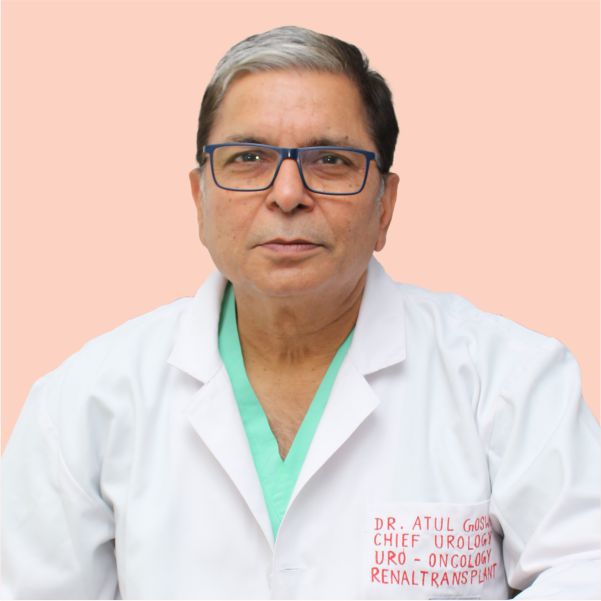Uro-oncology is a specialized field of medicine dedicated to the diagnosis, treatment, and management of cancers affecting the urinary tract and male reproductive system. This encompasses a range of malignancies, including those of the kidneys, bladder, prostate, testicles, and adrenal glands. Urological cancers constitute a significant health concern globally, and the field of uro-oncology plays a pivotal role in advancing treatment modalities and improving outcomes for patients.
Conditions Treated By Uro-oncology Department
- Prostate Cancer: This is the most common cancer in men and involves the prostate gland, which produces seminal fluid. Treatment can include surgery, radiation therapy, hormone therapy, and in some cases, chemotherapy.
- Bladder Cancer: Characterized by the growth of malignant cells in the bladder lining. Treatment options often include surgery, intravesical therapy, chemotherapy, radiation, or immunotherapy.
- Kidney (Renal) Cancer: Includes renal cell carcinoma and transitional cell carcinoma. Treatments may involve nephrectomy (removal of the kidney), partial nephrectomy, ablative therapies, and systemic treatments like targeted therapy and immunotherapy.
- Testicular Cancer: Although relatively rare, it's a highly treatable cancer affecting the testicles. Treatments usually include orchiectomy (removal of the affected testicle), chemotherapy, and radiation therapy.
- Penile Cancer: A rare form of cancer that typically starts on the skin of the penis. Treatment can involve surgery, radiation therapy, and in some cases, chemotherapy.
- Urethral Cancer: Another rare cancer that affects the urethra. Depending on the stage and location of the cancer, treatments might include surgery, radiation therapy, and chemotherapy.
- Adrenal Cancer: A rare cancer affecting the adrenal glands located above the kidneys. Treatment often includes surgery, and in some cases, radiation therapy and chemotherapy.
- Upper Tract Urothelial Cancer: This cancer affects the lining of the kidney and the ureter. Treatment usually involves surgery and may include chemotherapy or immunotherapy.
Key Procedures
- Cystoscopy and Transurethral Resection of Bladder Tumor (TURBT): This procedure involves the use of a cystoscope to examine the bladder and remove bladder tumors. TURBT is both diagnostic and therapeutic for bladder cancer.
- Radical Prostatectomy: A surgery to remove the entire prostate gland along with some surrounding tissue for the treatment of prostate cancer. This can be done through open surgery, laparoscopically, or using robot-assisted techniques.
- Radical Nephrectomy and Partial Nephrectomy: These surgeries involve the removal of the kidney (radical nephrectomy) or just the tumor within the kidney (partial nephrectomy), often used in the treatment of kidney cancer.
- Retroperitoneal Lymph Node Dissection (RPLND): A surgical procedure to remove abdominal lymph nodes to treat testicular cancer, especially for the management of non-seminomatous germ cell tumors.
- Intravesical Therapy for Bladder Cancer: Administration of immunotherapy (such as BCG) or chemotherapy directly into the bladder to treat early-stage bladder cancer or reduce recurrence risk.
- Orchiectomy: Removal of one or both testicles, often used in the treatment of testicular cancer.
- Radical Cystectomy and Urinary Diversion: Surgical removal of the bladder and creation of a new way for urine to exit the body, typically employed for invasive bladder cancer.
- Percutaneous Nephrolithotomy (PCNL): Although primarily a procedure for large kidney stones, PCNL can be used to obtain biopsy samples in cases of suspected kidney cancer.
- Systemic Therapies: Includes the administration of chemotherapy, hormonal therapy, immunotherapy, or targeted therapy, depending on the type and stage of the urological cancer.
- Radiotherapy: External beam radiation therapy or brachytherapy to treat or control the growth of urological cancers, such as prostate and bladder cancers.
Advantages Of The Department
- Specialized Expertise: Uro-oncology departments are staffed by specialists who have extensive training and experience in urological cancers. This expertise ensures patients receive the most accurate diagnoses and the best possible treatments.
- Comprehensive Cancer Care: These departments provide a full range of services, from diagnosis to treatment and follow-up care. This includes access to advanced surgical techniques, radiation therapy, chemotherapy, immunotherapy, and targeted therapy.
- Access to Clinical Trials and Research: Many uro-oncology departments are involved in research and offer patients access to clinical trials, providing them with opportunities to receive the newest treatments that might not be widely available.
- Improved Outcomes: The combination of specialized expertise, advanced treatment options, and a multidisciplinary approach generally leads to improved patient outcomes, including higher survival rates and better quality of life.
- Early Detection and Screening Programs: Uro-oncology departments may offer screening programs for high-risk individuals, leading to earlier detection of cancers when they are most treatable.
- Holistic Care: Besides focusing on the physical aspects of cancer treatment, holistic care including attention to emotional, social, and psychological needs is often an integral part of the department's services.
Call 011-42888888 to book an appointment with a specialist at Sri Balaji Action Medical Institute.
